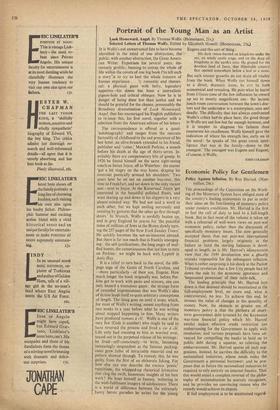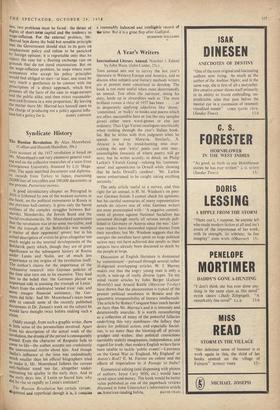Economic Policy for Gentlemen
Policy Against Inflation. By Roy Harrod. (Mac- millan, 24s.)
THE proceedings of-the Committee on the Work- ing of the Monetary System have obliged most of the country's leading economists to put in order their ideas on the functioning of monetary policy under modern conditions. Mr. Harrod is the first to feel the call of duty to lead to a full-length book. But in fact most of the volume is taken up with a rehearsal of well-worn views on post-war economic policy, rather than the discussion of specifically monetary issues. The now generally accepted thesis that our post-war international financial problems largely originate in the failure to fund the sterling balances is devel- oped at length, as is Mr. Harrod's idiosyncratic view that the 1949 devaluation was a ghastly mistake responsible for the subsequent inflation. What is rather surprising is his shock at the Parker Tribunal revelation that a few City people had let down the side by the economic ignorance and inspissated pessimism' of their table-talk.
The leading principle that Mr. Harrod lays down is that demand should be maintained at the full-employment level, no more and, what is controversial, no less. To achieve this end, he stresses the, value of changes in the quantity of money. Now, the obstacle to greater use of monetary policy is that the plethora of short- term government debt (created by the Keynesian war-time financial policy which Mr. Harrod extols) makes effective credit restriction too embarrassing for the Government to apply with resolution; and various proposals have been ad- 'vanced for compelling the banks to hold on to public debt during a squeeze, so relieving the embarrassment. Mr. Harrod spurns all such sug- gestions. Instead, he ascribes the difficulty to the nationalised industries, whose needs make the Government a perennial borrower; and he pro- poses that in future the nationalised industries be required to rely entirely on internal finance. That this would entail a complete reversal of the philo- sophy of nationalisation he scarcely recognises; and he provides no convincing reason why the remedy would achieve its objects.
If full employment is to be maintained regard-
less, two problems must be faced : the threat of flights of short-term capital and the tendency to wage-inflation. For the external problem, Mr. Harrod lays down the bold but sensible principle that the Government should stick to its guns on employment policy and refuse to be panicked by foreign opinion; it is regrettable only that he rejects the case for a floating exchange rate on grounds that do not stand examination. But on the wage-inflation problem, he stops where most economists who accept his policy principles would feel obliged to start—at least, one must be very much a gentleman to be content with the Prescription of 'a direct approach, which first Presents all the facts of the case to wage-earners and the public alike, and then mixes reasonable- ness and firmness in a wise proportion.' By leaving the matter there Mr. Harrod lays himself open to the charge of producing not a policy against infla-



































 Previous page
Previous page